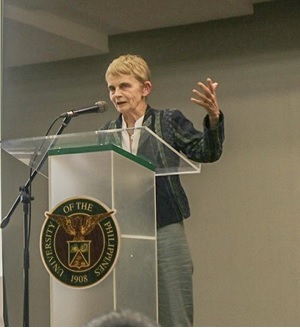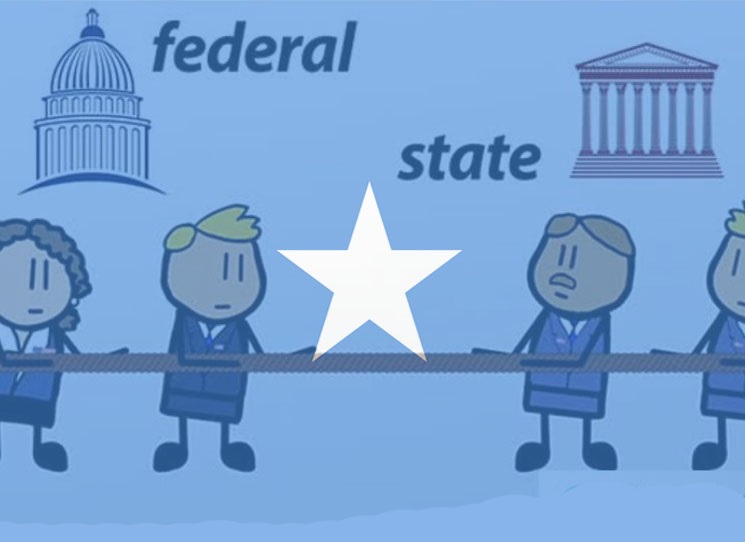December 9, 2021
By Deeq Yusuf & Adan Makina
Recently, we came across a widely circulated YouTube video that was on the concept of federalism by the Laureate Professor Emeritus Prof. Cheryl Saunders of Melbourne University Law School on Federalism, wherein she objects that federalism will not work in Somalia while giving Ethiopia the upper hand. Why Federalism Failed in Somalia is a long video (Prof Saunders of Melb Uni Law school on Federalism) that is worth watching for students of political science, anthropology and sociology. Having watched the video again and again, we felt befuddled by the deceitful way she tried to convince her spectators or listeners.

We watched the video and there is no doubt in our minds that this Professor’s false assumptions are informed by ignorance and premised on shallow Eurocentric thought. She is basically arguing that Somalis cannot build a Federal or modern state simply because they are a “tribal” society. She sounds more like those ignorant colonial anthropologists of the past than an informed contemporary legal scholar. However, Mr. Makina of WardheerNews, who has been a keen follower of foreigners who have negative agendas about Somalis, instead, describes her as a Racialist Anthropologist.
She lays bare her ignorance right from the outset when she labels Somalis as “tribes.” Like foreign and Somali scholars who got stuck to the ideology of referring Somalis as “pastoral-nomadic” that was first sounded by the first President of Somalia Aden Adde (July 1, 1960 to July 6, 1967) at the 1963 Organization of African Union (OAU) in defense of Somali unity, the lady professor has strayed from academic and scholarly identification of groups that is social generalization which is unacceptable and nonacademic. Somalis are only one ethnic group comprised of clans, and so any Eurocentric scholar who refers to Somalis as a tribe is just an ignorant lot.
Anthropologically, the term “tribe” is no longer given preference or significance in contemporary research and that “clan” is preferred instead. The Professor Emeritus’ superfluous application of “Why Federalism Failed in Somalia” seems to be a plagiaristic medley of a book that was written by three distinguished professors having 135-years of experience in African governance. Thus, her video presentation is nothing but simply a chameleonic display of the academically scandalous book whose topic was “The Nation State: A Wrong Model for the Horn of Africa.” The aforementioned book was written by John, Schlee and Young (2021) and is one meant to instill social anxiety and social stratification among the people of the Horn of Africa.
Secondly, she argues Somalis cannot build a federal state because they are loyal to their tribe, not their representatives. Where did she get this one? Does she have empirical evidence to back this misplaced claim? Can she point to a study, or a report of some sort conducted by competent researchers attesting to this claim? How can a so-called scholar in law use unproven anecdotal evidence to make such a blatantly false claim? Also, in every Federal system identity and loyalty to a region or state are actually important and this does not in any way negate the foundation of Federalism.
In Germany, the Bavarians are known to be fiercely loyal to their regional identity and so are Canada’s Quebecois to whom French identity, culture and language are critically important to their survival in Canada, and yet no one has argued Canada or Germany can’t function as a Federation. In the case of Quebec, they even went into referendum twice to determine their future and in the second instance came within a whisker of breaking up Canada. In fact, the separatists in Quebec call themselves Sovereigntists, and yet with all this open Quebecois nationalism, no one has put into question the very nature of Canadian Federalism, which remains vibrant.
Further, Federalism cannot be measured on a misplaced analogy that emphasizes loyalty to a specific group vs allegiance to an elected representative. This is way too simplistic and ignorantly casual. Also, her claim that you must demonstrate unity or else you cannot build a Federal system is laughable. Many Federal countries, even in advanced democracies struggle with unity but work hard to make things function.
The US is a deeply divided, polarized society, but are we going to claim US Federalism has failed on account of its pervasive societal polarization? Absolutely not. What this lady doesn’t get is that the basis upon which a Federal system is built is “cooperation,” not perceived “unity.” Federal and state entities need not unite on everything, but they must fundamentally cooperate to make Federalism work. In the lexicon of Federalism, the magic word is “cooperated” not “unite,” because essentially, Federalism, especially in the South, is meant to bring together “deeply divided” societies to “cooperate” and work together in a federated state. Even in the US, Federalism has evolved through the decades, from cooperative federalism, to dual federalism and finally new federalism.

It is totally absurd to claim that Federalism in Somalia has failed, given its nascent and evolving stage. It was only 2016, when Somalia transitioned to Federalism after going through a transitional period. You cannot pass judgement on an ongoing 5-year nascent experience, in a post-conflict environment where the country is still governed by a provisional constitution. Anyone who makes such a reckless statement needs a crash course in Politics 101, even if they hold some law degree from somewhere. She said it took Australia 10 good years to agree on a federal constitution before they could even settle for a federal system. I think she needs to appreciate Somalia’s maturity where from the outset, and in just few short years, they already have a provisional federal constitution with nascent federal structures in place, and all this built from the ashes of civil war.
Going back to the history of post-federalism in Europe, even Switzerland experienced the Sonderbund War for cessation in 1848. A nation that avoided federalism for fear of unintentional fall into the “slippery slope” of federalism is Sri Lanka that was involved in multicultural and multilingual war for 15 years.[i] Unlike Indonesia–a predominantly Muslim nation of 200 million that rejected federalism after the fall of Suharto, had the Professor Emeritus been given the chance and will to lay her hands on Somalia, she would have fragmented Somalia into a federacy that would have created the likes of Aceh and Irian Jaya. But such adventures would never happen in Somalia because, Somalis, when it comes to land or territorial issues, immediately mobilize and unite to safeguard their territorial rights.
The learned Professor Emeritus has failed to focus on what we refer to as post-federated states that have territorial based semasiological break-ups like the case of Ethiopia that has over 80 ethnic groups and almost 90 languages while Somalia is almost homogenous and monocultural unlike Ethiopia and Kenya that are heterogenous and multicultural. Even before the proclamation of independence, Somalis have been pastoral democrats. In terms of democratic governance, Somalia was the first in global Africa to produce the first democrats in Africa as noted by the two distinguished Somali professors and brothers Ahmed & Abdi Ismail Samatar.[ii] Since democracy and federalism are inseparable, unlike some countries that remain reluctant to grasp federalism, Somalia, regardless of having tribal divisions, has already abandoned the old method of centralization.
The political schisms in Somalia that the Professor Emeritus assumes will continue forever is nothing but exaggerated imaginations lacking political substances. She needs to re-study the host of negative linguistic proliferations written in the past by scholars of her caliber who wasted their time and energy maligning the good name and reputation of Somalis and Somalia and how at last they got misguided academically and scholarly after being set on the right track by people endowed with reasoning power. Lack of critical thinking is a recipe for disaster for researchers who fail to pick up the pieces after going astray. In modern times, the rise of literary braggadocios has become common and it is no wonder human pomposity has become the norm. The use of terminologies and phrases like “stateless”, “disassembled state”, “in search of a state” and “state and identity” etc. have become meaningless since Somalia has already recovered from the ashes of destruction.
Currently, every regional state in Somalia is experiencing formidable growth politically, socially and economically while her two neighbors, Kenya and Ethiopia are immersed in ethnic imbroglios. In the meantime, the major factor that is dragging Somalia backwards is foreign interference. Had Somalis been left to manage their affairs with the help of a non-partisan nation like Turkey, it would have prospered meritoriously in all aspects of federal governance. The Somali Federal Government (SFG) in collaboration with friendly military and economic powers, helped create a military force to reckon with, such that, the presence of African forces is totally unnecessary.
The city of Mogadishu is now the fastest growing in Africa while other states are experiencing tremendous overall growth. Somalia prides to have the fastest and cheapest mobile and internet connectivity, while, it still has the fastest money transfer remittance system in Africa, if not globally. Piracy and religious fundamentalism that have been foreign-funded inventions are now dwindling. Foreign aid meant for humanitarian purposes surreptitiously ended up in the accounts of foreigners and their Somali counterparts.
In a well-crafted video that we watched together where an Indian scholar is a guest, we were shocked to learn that between 1765 and 1938, the British Isles stole 23 trillion pounds from India. Likewise, they stole all the coal and other natural resources using Indian labor to help build their country. There is no doubt that colonial mentality among Western powers is still in progression. When 2.7 billion people have no food on the table, Western powers keep on lecturing developing countries to reduce consumption. In a nutshell, the lady Professor Emeritus has a hidden strategic agenda to demonize Somalis and Somalia and rest assured, regardless of her preparation for other denigrating speeches in the future, whatever she’ll come up with, will be discarded and regarded as inconsequential.
With regard to Ethiopia, it is also wrong to pass judgement on Ethnic–Federalism, because it only existed on paper as the Tigrayan elites of the day reigned over a highly centralized state that subjugated the rest of Ethiopians. So, you cannot reach a conclusion on a system that was illogical syllogism and imbecilic. It is the same Tigrayan predaceous centralized hooliganism that is the cause of the current political conflagration in Ethiopia. Despite all the challenges Somalia has been through, we think Somalis have done a great job in building a nascent Federal system that is worth celebrating.
The plethora of inconsistent resentment that have become common with foreign tergiversators should be discarded and thrown into the trash bags without any remorse. Somalia is for Somalis and they are the once deserving of choosing their political desiderata and as well, correcting what goes wrong within their historical peninsula. Finally, we have to defy all Eurocentric nullifidians and continue to deconstruct their negative narratives that are borne out of naked ignorance.
Deeq Yusuf
Email: Deeqsyusuf05@gmail.com
Adan Makina
Email: adan.makina@gmail.com
——————-
[i] Stepan, A.C. (1999). Federalism and Democracy: Beyond the U.S Model. Journal of Democracy. John Hopkins University Press.
[ii]Samatar, A. I., & Samatar, A. I. (2002). Somalis as Africa’s First Democrats: Premier Abdirazak H. Hussein and President Aden A. Osman. Bildhaan: An International Journal of Somali Studies, 2(4), 1-64.
